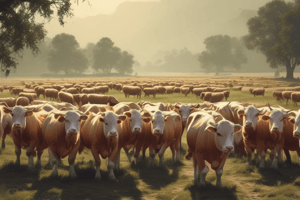Podcast
Questions and Answers
What is the term for the male of a cow?
What is the term for the male of a cow?
- Steer
- Bull (correct)
- Heifer
- Calf
Why is it important to remove calves from their mother after one hour of parturition?
Why is it important to remove calves from their mother after one hour of parturition?
- To improve bonding between the calf and mother
- To ensure proper nutrition for the calf
- To reduce milk production
- To prevent disease transmission (correct)
What percentage of total solids is found in milk?
What percentage of total solids is found in milk?
- 12%
- 15%
- 13% (correct)
- 10%
What is the primary function of water in calf consumption?
What is the primary function of water in calf consumption?
What is the objective of a heifer?
What is the objective of a heifer?
At what age should heifers be bred?
At what age should heifers be bred?
What happens to a cow's body weight during peak milk production?
What happens to a cow's body weight during peak milk production?
What is the term for cows in the first 21 days of lactation?
What is the term for cows in the first 21 days of lactation?
Flashcards are hidden until you start studying
Study Notes
Dairy Cattle Terminology
- A male cow is called a bull.
- Colostrum is the first milk produced after calving.
Calves Rearing
- Calves should be removed from their mother within one hour of parturition.
- Calves that don't consume colostrum can be fed using an esophageal feeder.
- The starter is a mixture of grains, protein, and molasses fed to calves after the first week.
- Water is essential for stimulating starter consumption.
Pre-Weaning Diet
- Calves should only be given water, milk, and starter before weaning.
- Hay should not be given to calves before weaning.
Heifer Management
- The objective of a heifer is to become a replacement mother in the future.
- Heifers should be bred at 15 months of age.
- Heifers calving at younger ages are not less productive than those calving at older ages.
- Heifers require a high protein and energy diet after weaning, with 50% concentrate and 50% roughages, for 2-3 months.
Milking and Lactation
- Milking should stop 60 days before parturition.
- A cow is considered "close up" when there are 21 days left until calving.
- NEI stands for Net Energy Lactation.
- Negative energy balance occurs when a cow's body weight decreases due to high milk production.
- This decrease in body weight is because the energy required to produce milk is higher than the energy consumed from the diet.
Dry Cows and Fresh Cows
- Dry cows are those in the 7th month of pregnancy.
- Fresh cows are those in the first 21 days of lactation.
Health and Nutrition
- Consuming large amounts of fat without fully metabolizing it can cause ketosis.
- The lactation period for a cow is 305 days.
- During the peak of milk production, body weight decreases due to high energy demand.
Studying That Suits You
Use AI to generate personalized quizzes and flashcards to suit your learning preferences.




